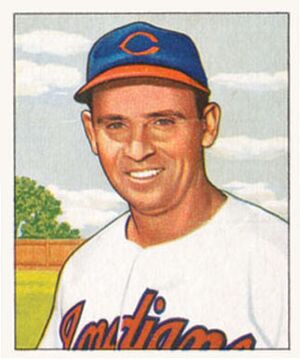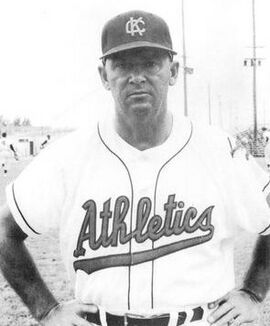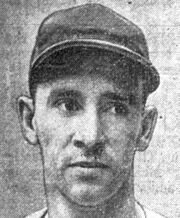Joe Gordon facts for kids
Quick facts for kids Joe Gordon |
|||
|---|---|---|---|
 |
|||
| Second baseman / Manager | |||
| Born: February 18, 1915 Los Angeles, California, U.S. |
|||
| Died: April 14, 1978 (aged 63) Sacramento, California, U.S. |
|||
|
|||
| debut | |||
| April 18, 1938, for the New York Yankees | |||
| Last appearance | |||
| September 30, 1950, for the Cleveland Indians | |||
| MLB statistics | |||
| Batting average | .268 | ||
| Home runs | 253 | ||
| Runs batted in | 975 | ||
| Managerial record | 305–308 | ||
| Winning % | .498 | ||
| Teams | |||
As player
As manager
|
|||
| Career highlights and awards | |||
|
|||
| Induction | 2009 | ||
| Vote | 83.3% | ||
| Election Method | Veterans Committee | ||
Joseph "Joe" Lowell Gordon (born February 18, 1915 – died April 14, 1978) was a famous American baseball player. People called him "Flash" because he was so quick, like the comic book hero Flash Gordon. He played as a second baseman for the New York Yankees and Cleveland Indians from 1938 to 1950. Later, he also worked as a coach and manager.
Joe Gordon was one of the best players at his position in the 1940s. He won the MVP Award in 1942. He was also chosen for the The Sporting News Major League All-Star Team in nine of his eleven seasons. Gordon was known for his amazing defense, making many assists and double plays. He was the first American League second baseman to hit 20 home runs in a season. He helped the Cleveland Indians win the World Series in 1948. In 2009, he was added to the Baseball Hall of Fame.
Contents
Early Life and College Sports
Joe Gordon was born in Los Angeles, California, in 1915. His family later moved to Oregon. There, he went to Jefferson High School. After high school, Joe went to the University of Oregon. He was a talented athlete, playing many sports. He was a halfback on the football team. He also competed in gymnastics, soccer, and the long jump.
But Joe wasn't just good at sports. He also played the violin in the college orchestra! He played for the Ducks baseball team in 1934 and 1935. He helped his team win their division both years. Joe had a great batting average of .358 while at Oregon.
Playing for the New York Yankees
Joe Gordon signed with the New York Yankees in 1936. A scout said he was "at his best when it meant the most." He started in the minor leagues. In 1937, he played for the Newark Bears, a very strong minor league team. This team won 110 games and had many future All-Stars.
Joe joined the Yankees in 1938. As a rookie, he hit 25 home runs. This set a new American League record for a second baseman. He also had 97 RBI. The Yankees won the 1938 World Series that year. Joe hit .400 in the World Series, helping his team win.
In 1939, Joe hit 28 home runs and had 111 RBI. He was chosen for his first All-Star team. The Yankees won the 1939 World Series again, their fourth straight championship. Joe kept getting better in 1940, hitting 30 home runs. He also had career highs in runs (112) and stolen bases (18). On September 8, he even hit for the cycle!
In 1941, Joe helped the Yankees win the 1941 World Series. He played incredibly well, hitting .500 in the Series. His defense was also amazing. Yankees manager Joe McCarthy said Joe was "The greatest all-around ballplayer I ever saw."
Joe had his best year in 1942. He won the American League MVP Award. He batted .322 with 18 home runs and 103 RBI. He and shortstop Phil Rizzuto were a great team, leading the league in double plays. The Yankees lost the 1942 World Series that year, which was Joe's only Series loss.
In 1943, Joe still played well, hitting 17 home runs. The Yankees won the 1943 World Series against the St. Louis Cardinals. Joe played fantastic defense in that Series. He set records for putouts and assists for a five-game Series. After this, he served in the U.S. Army during World War II in 1944–45. He missed those two baseball seasons.
Joe returned to the Yankees in 1946. It was a tough year for him because of injuries. He had hand surgery and tore leg muscles. He only played in 112 games. After this difficult season, the Yankees traded Joe. He had played exactly 1,000 games and had 1,000 hits for the Yankees.
Joining the Cleveland Indians
In 1947, Joe Gordon was traded to the Cleveland Indians. He quickly returned to his top form. He batted .272 and led the team with 93 RBI. He also hit 29 home runs. Joe was a great help to his new teammate, Larry Doby. Doby was the first black player in the American League. Joe became a close friend to Doby, helping him feel welcome.
The 1948 season was even better for Joe. Cleveland won their first American League title since 1920. Joe hit 32 home runs, which was second in the league. He also had a personal high of 124 RBI. Joe helped the Indians win the 1948 World Series against the Boston Braves. He hit a home run in the final game, helping Cleveland win the championship.
Joe played two more seasons for the Indians. He ended his playing career in 1950. Overall, Joe Gordon had a career batting average of .268. He hit 253 home runs and had 975 RBI. He was chosen for the All-Star team nine times during his career.
Later Years and Managing Career
After his playing days, Joe Gordon became a player-manager for a minor league team in 1951–52. He still played well, hitting 43 home runs in 1951. Then, he worked as a scout and coach for a few years. In 1957, he managed the San Francisco Seals to a championship.

Joe then became a manager for four different Major League Baseball teams. He started managing the Cleveland Indians in 1958. He also managed the Detroit Tigers, Kansas City Athletics, and Kansas City Royals. He was known for being traded between teams, even as a manager! After managing, Joe worked in real estate. He passed away in 1978 at age 63.
In 2008, Joe Gordon was inducted into the Cleveland Indians Hall of Fame. The next year, in 2009, he was elected to the Baseball Hall of Fame. His daughter gave a speech at the ceremony. A sports writer for the Wall Street Journal even called Joe Gordon the 9th-greatest Yankees position player ever. In 2013, Joe was honored for his service in the U.S. Army during World War II.
Managerial Record
| Team | Year | Regular season | Postseason | |||||||
|---|---|---|---|---|---|---|---|---|---|---|
| Games | Won | Lost | Win % | Finish | Won | Lost | Win % | Result | ||
| CLE | 1958 | 86 | 46 | 40 | .535 | Interim | – | – | – | |
| CLE | 1959 | 154 | 89 | 65 | .578 | 2nd in AL | – | – | – | |
| CLE | 1960 | 95 | 49 | 46 | .516 | Traded | – | – | – | |
| CLE total | 335 | 184 | 151 | .549 | 0 | 0 | – | |||
| DET | 1960 | 57 | 26 | 31 | .456 | 6th in AL | – | – | – | |
| DET total | 57 | 26 | 31 | .456 | 0 | 0 | – | |||
| KCA | 1961 | 59 | 26 | 33 | .441 | Fired | – | – | – | |
| KCA total | 59 | 26 | 33 | .441 | 0 | 0 | – | |||
| KC | 1969 | 162 | 69 | 93 | .426 | 4th in AL West | – | – | – | |
| KC total | 59 | 26 | 33 | .441 | 0 | 0 | – | |||
| Total | 613 | 305 | 308 | .498 | 0 | 0 | – | |||
See also
- List of Major League Baseball career home run leaders
- List of Major League Baseball players to hit for the cycle
- Major League Baseball Most Valuable Player Award
 | William M. Jackson |
 | Juan E. Gilbert |
 | Neil deGrasse Tyson |


